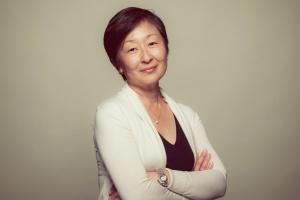
Shirley Nakata is the Ombudsperson for Students at the University of British Columbia (UBC), a career that she finds fascinating as it allows her to navigate the fairness issues arising between students and the University in a complex and diverse environment. Born in Osaka, Japan, Nakata immigrated to Canada at the age of four. She describes her upbringing as one that would be typical of an immigrant family growing up in East Vancouver in the late 1960s in which pursuing a post-secondary education was not optional. Her parents’ education ended when the Second World War broke out in Japan, her mother in grade six, her father in grade 8. They chose Canada as their new home because they believed that a good education for their children was attainable despite their own financial and personal circumstances.
After completing a Bachelor of Arts degree with a double major in Political Science and Japanese at UBC, Nakata took a gap year teaching English in Japan, and applied to the UBC Faculty of Law during this period.
“I never wanted to be a lawyer,” says Nakata. “Early on, I developed an interest in law because I wanted to make the world a better place. To be able to change fundamental systems and structures in society, I felt that an understanding of the legal system would be important. A legal education would provide me with the framework and competencies to do the things I wanted.”
During her time at law school, Nakata found one particular course particularly impactful, and experienced a paradigmatic shift from liberal to radical feminism.
“I would say I was a liberal feminist in my earlier years. However, I took Jurisprudence with J.C. Smith and the way in which radical feminism was presented resonated: it was not a question about whether women and men had equal access to the same race, but rather how that race had been structured and perpetuated by patriarchy.”
Law school was an experience that Nakata found rewarding. Beyond the substantive aspects of law, Nakata describes the process of legal education as one that equipped her with a wide variety of transferable skills. More importantly she learned the importance of building relationships and of collegiality and collaboration in order to achieve the most satisfying and effective outcomes.
Nakata articled at a large downtown law firm, hoping to gain broad experience in various aspects of law practice. After articles, she joined the firm and practiced general litigation. In a few years, she became convinced that the practice of law was not her calling. Nakata adds that the reality is that many people do leave the legal profession for various reasons, but there remains to this day an exodus of women.
“As an Asian woman, the profession felt overbearingly male and Caucasian in culture and perspective. There is more dialogue about equitable and inclusive environments nowadays, which is positive, but the demographics of the legal profession still do not reflect what we see in law schools.”
After two years of practice, Nakata had the opportunity to be introduced to the Canadian Human Rights Commission (CHRC) by a colleague. Nakata saw the opportunity to work in an area that she had always been passionate about and pursued it. She found it rejuvenating to be able to speak and work in the language of human rights and administrative law and contribute in a way that aligned with her core values.
When in the mid-1990s, the CHRC underwent organizational restructuring, Nakata started to explore her options and took a one-year contract position with the British Columbia College of Teachers (BCCT), the (then) self-regulatory body for the teaching profession. After a year in this capacity, Nakata was promoted to the position of Director of Professional Conduct and managed the professional discipline process. She describes it as a pivotal point in her career, when she learned a great deal from her colleagues and from the senior legal counsel she had the privilege of instructing. She was able to apply her legal education and hone her expertise in administrative law while she acted first and foremost to protect the public interest.
Thirteen years later, Nakata began searching for a different career path with organizational changes on the horizon at the BCCT. She noticed an opportunity with UBC and was attracted by the idea of returning to her alma mater and giving back to the institution which helped form the foundation of her professional career to date. Nakata ultimately secured the position, creating and launching the first UBC Ombudsperson Office for Students in 2009.
“Never did I think ‘I want to be an ombudsperson when I grow up’,” says Nakata, “but I have the opportunity to shape this new office at UBC and my role in it with my vision of what it means to be an agent of change at a first-rate university. Ombudspersons are often called the ‘conscience of an organization’, and that conscience will be informed by the choices I have made so far in my life and will be infused and informed by my being a feminist lawyer.”
First published on August 17, 2016.